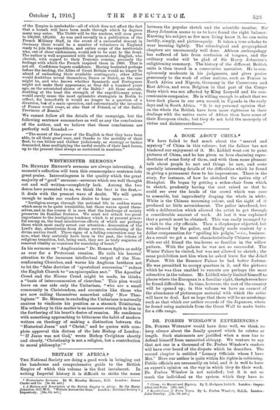A BOOK ABOUT CHINA.*
WE have failed to find much about the " marvel and mystery" of China in this volume ; but the failure has not hindered our enjoyment of it. Mr. Liddell went out to paint pictures of China, and he has given us here charming repro- ductions of some forty of them, and with them some pleasant talk about people he met and things he saw, and some specially interesting details of the difficulties which he found in giving a permanent form to his impressions. There is the story, for instance, of how he sketched the native city of Shanghai. He began by getting a sedan-chair from which to sketch, prudently having the seat raised so that he could see over the heads of the crowd which was sure to assemble, but imprudently draping the whole in white. White is the Chinese mourning colour, and the sight of it produced no little astonishment. The police interfered, but with a deliberation which allowed the artist to get through a considerable amount of work. At last it was explained that a permit must be obtained. This was easily managed by- a visit to the city officials. Then a shopkeeper objected, but was silenced by the police, and -finally made content by a dollar compensation for• " spoiling his pidgin,"—i.e., business. As a result we get a most characteristisally Chinese picture with our old friend the tea-house so familiar in the willow pattern. With the palaces he was not so successful. The Winter Palace he visited, but was not allowed to sketch ; the same prohibition met him when he asked leave for the Jehol Palace. With the Summer Palace he had better fortune. He was permitted to occupy quarters in it, and the pictures which he was thus enabled to execute are perhaps the most attractive in the volume. Mr. Liddell wisely limited himself to places where the European is a familiar sight, though even here he found difficulties. In time, however•, the rest of the country- will be opened up ; in this volume we have an earnest of the abundance of picturesque material with which the artist will have to deal. Let us hope that there will be no misdoings such as that which our author records of the Japanese, whom he found using materials from the Great Wall to make butts for a rifle range.


























































 Previous page
Previous page